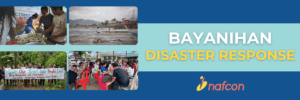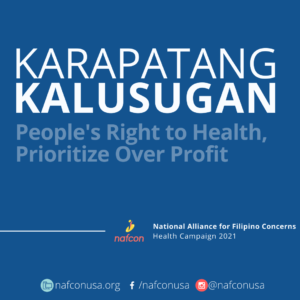What are the demands of Filipino Community?
- Workers’ Rights and Economic Rights
- Immigrant Rights
- Youth and Students
- Women
- LGBTQ Community
- Small Business and Property Owners
- Educators
- Foreign Policy
- On Police Brutality and Anti-Asian Violence
WORKERS’ RIGHTS AND ECONOMIC RIGHTS
Working class Filipinos comprise the majority (59%) of Filipinos in the U.S. Many are in the Service industry (84%) and are considered as “essential workers.” These Filipino workers, ranging from restaurant, grocery, and warehouse workers to workers in the health care industry, are bearing the brunt of the economic crisis made worse by COVID 19 pandemic. Many Filipino workers cannot “work from home” and are at increased risk of contracting COVID. Many have been laid off during the pandemic or are in danger of losing their livelihood. Many are living from paycheck to paycheck and are unable to pay rent.
Filipinos comprise a large number of health workers in the US. According to CNA: “Nearly a third of the nurses who’ve died of coronavirus in the US are Filipino, even though Filipino nurses make up just 4% of the nursing population nationwide.” As the pandemic continues, there should be additional support to all Filipino Health workers, especially those on the frontlines everyday.
- Uphold the rights of workers to organize and concerted action to improve their working conditions.
- Implement guaranteed basic income to the unemployed and underemployed until the end of the pandemic, including undocumented.
- Ensure adequate staffing and safe workload for healthcare workers.
- Implement stricter anti-wage theft laws, human trafficking laws, and other worker protections.
- Raise the federal minimum wage to $15 per hour. Raise the minimum wage to be a liveable wage wherever you live / equal to the highest pay for the minimum wage.
- Implement hazard pay for all essential workers and healthcare workers, and ensure workplaces have safe COVID-19 measures in place.
- Equitable, and systematic distribution of COVID-19 vaccines, prioritizing elders, healthcare workers, essential workers and immuno-compromised people.
- Provide vaccine education, culturally-relevant public health resources, and promote scientific health information about the vaccine.
- Support working families with adequate stimulus funds, low-income and affordable housing, guidance on how to access housing resources, and better public transportation
- Implement institutional support for disabled and senior citizens in the workplace, with healthcare, and with COVID vaccine allocation
- Implement rent cancellation and impose a moratorium on all evictions until the pandemic is declared over.
- Increase federal funding for healthcare, including mental health resources and ensure access to healthcare for all.
IMMIGRANT RIGHTS
Around 14% of the U.S. population are immigrants, contributing immensely to the country’s economy, culture, politics and other aspects of society. In the midst of the pandemic, we have witnessed how immigrant workers and professionals in healthcare and other essential industries continue to be part of the backbone of society. Despite this, anti-immigrant policies and rhetoric terrorize immigrant communities and separate families seeking refuge. Among the 11 million undocumented immigrants in the U.S., hundreds of thousands are Filipino and at least 3,270 are Filipino DACA recipients.
In 2020, we have witnessed thousands of Filipino workers on J-1 visa who have fallen victim to unscrupulous business practices and neglect by both the U.S. and Philippine governments. At the same time, Filipinos continue to fall prey to labor trafficking across the country. Thus the Filipino community must advocate for reforms in immigration policy alongside other immigrant communities.
- Create an inclusive pathway to citizenship for undocumented immigrants.
- Increase Immigrant Visa quotas and immediately address the backlog for family petitions to address family separation.
- Stop the ICE raids. Impose a moratorium on deportations.
- Free the detainees, especially those at high risk of COVID-19.
- Investigate irregularities within and violations of the J-1 Visa program and its connections to host and sending countries.
- Ensure protection of the rights of guest workers especially of H1b, H2b, J-1 workers, other guestworkers, seafarers and other migrant workers.
- Disaggregate data on “Asians” category to ensure proper representation and appropriate allocation of resources to the diverse Asian community.
- Support Filipino American veterans, and their families with healthcare, and housing and immigration, such as continuing the Filipino WWII Veterans Parole Program.
- Provide stimulus funds and assistance for the undocumented community
- Ensure equitable and affordable healthcare, mental health services and housing resources for immigrant communities
YOUTH AND STUDENTS
Young people and students make up a significant percentage of the Filipino-American population in the US. Like other youth, they face increasing costs in tuition and other school fees, and often have to resort to taking out large amounts of debt to pay for education, with an average debt of $32,731. Because of the historic migration of Filipino families from the Philippines via enlistment in the US armed forces, many Filipino youth are pushed by their families and specifically targeted by recruiters to join military service as the only affordable way to access higher education. We believe that barriers to higher education should be removed so that young people have a choice in pursuing education. Economic and worker rights should also be extended for all youth who must work to pay for education and support their families.
Filipino youth also often face cultural and identity crises as a result of the lack of culturally relevant education, as well as the impacts of a US colonial education in the Philippines that inform and shape the views of many migrant and immigrant families. This, compounded by the economic hardship many of these families face, can also lead to mental health crises to their young minds. We believe that education and access to other social services should be tailored to address these challenges among youth. Filipino youth have a history of fighting for these rights, such as in the Third World Liberation Front in the 1960s and Assembly Bill 123 for Filipino studies across California.
- Provide free and quality education at all levels.
- Immediately cancel all student debt.
- Implement culturally relevant and pro-people education; expand ethnic studies to be an educational requirement in K-12+; and improve access to school cultural programs.
- Prioritize the federal budget for education and other social services.
- Expand access to mental health services, counseling, and college-readiness programs for all students.
- Guarantee the rights of young workers.
- Support English language acquisition and bilingual language maintenance in curriculum taught within primary and secondary school.
WOMEN
Filipino women in the United States are majority (63.4%) working class/low income who have to juggle working and taking care of their families. They usually work in essential industries. Hence, working from home while caring for their children is not an option. Exorbitant costs of childcare means working class Filipino women are forced to choose between working to feed their children and leaving them at home to fend for themselves, or working less to care for their children and struggling to pay for basic expenses like rent, food, and utilities. Additionally, according to a study by the Centers for Disease Control and Prevention (CDCP), adolescent Filipino women are more likely to have suicidal thoughts than other women of color. Now more than ever Filipino women are in need of assistance and social services, such as free childcare and mental health services, to meet their basic needs and to care for their families.
About 90.4% of Filipino women workers in the United States work in the service sector, providing much needed services to the people, in industries such as healthcare and food service. They contribute greatly to the economy but they, like many, still experience gender based discrimination and harassment at work and protections must be ensured.
The majority of Filipino women in the United States were born in the Philippines. Due to rampant unemployment, most of them are forced to migrate abroad in order to find a way to survive. Some migrate to the US because of marriage. They hope for love and a better life but many fall victim to domestic violence and even murder. More protections are needed for abused migrant women.
- Strengthen laws that protect women’s and trans women’s rights in the workplace, such as federal policy for paid maternity and parental leave
- Strengthen laws that prohibit against harassment and violence against women in the workplace
- Ensure that basic utilities are regulated and affordable and provide disconnect moratorium and payment assistance as options to all necessary households
- Provide free childcare or daycare to families
- Provide free mental health services to all, accessible in people’s native languages
- Ensure the Violence Against Women Act (VAWA) is strengthened to protect migrant women escaping abusive relationships and give them documented status
LGBTQ COMMUNITY
LGBTQ Filipinos face discrimination at workplaces, including discriminatory hiring practices and homophobic and transphobic harassment and violence. With the Covid pandemic, they also increasingly face unemployment. Many are isolated from friends and family due to discriminiation, leading to increased rates of homelessness and difficulties obtaining resources particularly for healthcare and safe housing. Working class LGBTQ Filipinos face similar economic struggles akin to the working class strata of other sectors of Filipinos. They also face difficulties in accessing mental health services that could help many in facing trauma from discrimination, isolation, job loss, and other factors.
LGBTQ’s in the Philippines are sexually exploited. Many are forced into prostitution and other precarious jobs as a means to survive and support family because of the lack of livelihood opportunities. This is exacerbated by US-RP Military Agreements like the Visiting Forces Agreement, which allows access for U.S. troops to enter the Philippines and exploit LGBTQ Filipinos, especially in former base areas. The case of Jennifer Laude, a trans woman killed by US marine Joseph Scott Pemberton, exemplifies this. Pemberton was released from jail early, received a pardon from Duterte, and returned to the U.S.
- Strengthen laws that protect LGBTQ+ people’s rights in the workplace.
- Enforce fair hiring practices and protections against harassment and violence against LGBTQ+ people in the workplace
- Ensure equitable and affordable healthcare, mental health services and housing resources for LGBTQ+ people
- Prosecute Joseph Scott Pemberton and hold all US military troops accountable for violence against the LGBTQ+ community in the Philippines and all other LGBTQ+ people.
- Protect LGBTQ+ people from violence committed against individuals and groups within the LGTBQ+ community, especially trans people.
SMALL BUSINESS AND PROPERTY OWNERS
Filipinos have a rich history of setting up small businesses in the United States, such as family-owned businesses in largely Filipino neighborhoods like the Manilatowns of San Francisco and Los Angeles and Little Manila Queens in Woodside, NYC. Today, we see Filipinos running small groceries, restaurants, clothing and accessory brands, bookstores, handicraft shops, farms, and many others.
These businesses have long been affected by economic recessions, gentrification, and the rise of big companies. During the pandemic, many have been forced to operate in creative ways to remain afloat. With competition from big corporations like Amazon, small business owners—especially those run by low-income immigrant families without much access to capital—need support.
- Subsidize small and medium businesses that have been affected by the pandemic.
- Subsidize small farm owners who have been affected by the pandemic.
- Expand support for financial literacy, networks of support for mentorship, and funds to start small businesses.
EDUCATORS
Thousands of Filipino Americans are employed in educational professions across the U.S. They work with limited resources to do their jobs adequately. There has also been a noticeable increase in short-term labor recruitment of teachers, via H1-B visas, from the Philippines to help resolve the public education crisis in the U.S. The education system in the US has been severely under-resourced, especially when compared to other areas of federal spending. This has affected the quality of education, especially for students in vulnerable and marginalized communities. With limited support and resources, educators have to bear the burden of purchasing supplies for students–with these resources coming out of their own pockets– in order to provide the best education possible.
These opportunity gaps in teaching and learning has only been exacerbated by the COVID-19 pandemic, forcing educators to quickly adapt to virtual instruction at all grade levels. with little to no training or professional development. Educators being mostly left to their own devices, on top of household responsibilities such as childcare, has also affected the quality of education their students are receiving. This also affects the quality of life of educators as they face more stressful conditions under Covid in giving virtual instructions at home and not in school.
The Trump administration gave little prioritization for education, spending nearly $81 billion annually on education, while military spending is estimated to be $695.1 billion in 2020. It is in these conditions that the new Biden administration needs to make basic social services, like education, a higher priority when it comes to federal spending and allocation of resources.
- Allocate more funding and resources towards public education.
- Ensure hiring of more educators and that educators are best equipped to provide quality education for students.
- Ensure the economic safety net of educators, including resource allocation for more support in the mental and emotional labor that comes with providing quality education for students.
- Ensure schools, colleges, and universities meet COVID-19 safety measures and support educators when they begin reopening for in-person instruction.
FOREIGN POLICY
U.S. foreign policy continues to have a significant impact on our families and fellow Filipinos back home. We stand for a U.S. foreign policy that is based on respect for human rights, democracy and sovereignty of other countries.
Currently, the US continues to send our tax dollars that funds the Armed Forces of the Philippines (AFP) and the Philippine National Police (PNP), agents of the Duterte administration. In the past four years, the U.S. sent more than $550M of military aid to the AFP and the PNP. The AFP and PNP are recognized by various international institutions like the United Nations, European Union and many others to be responsible for many of the human rights violations.We recognize that what the US does abroad also impacts our communities locally. Money going to wars overseas should instead be spent on much needed economic relief, education and other social services.
- Pass the Philippine Human Rights Act to suspend military assistance to the Philippines until such time as human rights violations by Philippine military forces cease and the responsible state forces are held accountable.
- Ensure trade and military agreements between the Philippines and any foreign government respect Philippine sovereignty, human rights, especially worker and farmer rights, the environment, Philippine-owned small and medium businesses, and are based on mutual benefit.
- Redirect taxpayer money going towards U.S. military aid to social services such as healthcare, education, social security, stimulus checks, etc.
On Police Brutality and Anti-Asian Violence
- Hold police accountable in the cases of Angelo Quinto, Dennis Carolino, Toby Diller and other victims of police brutality;
- Address increasing attacks and hate crimes on the API community.


